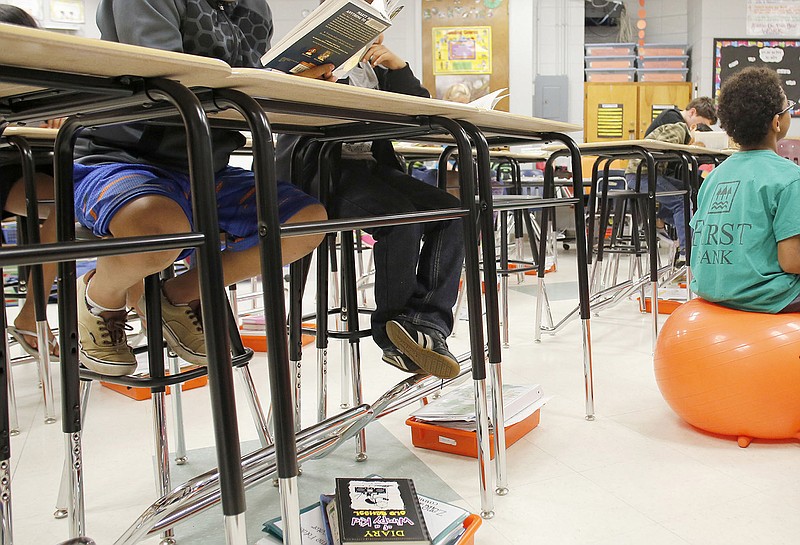It’s too early to suggest state legislators are finished coming up with time-wasting culture war bills, but with Gov. Sarah Sanders’ introduction of her education plans Wednesday, the General Assembly is on its way to some serious public policy debates. If lawmakers actually have them.
Sanders had a large herd of state lawmakers standing behind her at her mid-session public reveal of what she’s got in mind for Arkansas’ educational system. Sanders has declared education as her top priority.
Whether that priority is the improvement of Arkansas education or harming it depends on who you ask. But all the signs suggest most of the representatives and senators elected by the people of the state are eager to adopt Sanders’ vision for schools, students and teachers.
What’s reported as a major centerpiece of her plan is the proposal to increase the minimum teacher pay in the state to $50,000 a year. That’s impressive, indeed, when one takes into account that the current minimum is $36,000 annually.
In another time, Republicans would have howled at a $14,000-a-year pay increase for teachers as just throwing money at a problem. Of course, until Sanders, such a big leap would have more likely come from Democrats. Former Gov. Asa Hutchinson, who concluded his two terms last month, last year backed an increase $10,000, while House and Senate committees voiced support for $4,000-a-year raises. None of those proposals ever got close to being adopted, perhaps to help clear the way for Sanders’ lead on the issue.
Sanders is a month in as a governor elected by 63 percent of the state’s voters. Her coattails — to use an outdated term that assumed politicians were men — look pretty big right now. As evidenced by her selection to give last week’s Republican response to President Joe Biden’s State of the Union Address, Sanders is on her way up in national GOP politics. Lawmakers appear to be clamoring to get aboard those coattails and be among the “in” crowd at the Capitol.
I don’t think teacher pay is the centerpiece of Sanders’ education changes at all, though. That’s a honor reserved for school vouchers, or Education Freedom Accounts, as her plan calls them. A $14,000 increase in pay for teachers is a dangling carrot, and a big part of the reason she insisted her package of educational changes must be considered in a single piece of legislation rather than voted on individually.
Go back a few hundred years and free — that is, taxpayer-supported — public schools were created to be the antidote to ignorance, achieving the democratization of education. That Sanders is, in effect, attempting to privatize portions of state-funded education by “empowering parents” is corrosive to the concept of public schools.
No, students shouldn’t be trapped in awful schools just because they live in a particular neighborhood. But our communities overall are well-served by taxpayer-supported public schools, not private schools that have the luxury of picking the students they want.
Supporters say vouchers — the ability of parents to direct state education funding wherever they want their child to go — will foster competition among educators and schools. But it’s unfair competition as long as any of the schools get to handpick the students who make up their classes. The only way true choice and competition happens is if every school, public, private and charter, must accept every kid who walks through the door; if the schools provide transportation; if all schools feed those who can’t afford to eat.
Voucher proponents have done a good job in recent years convincing people that it’s fundamental fairness that parents should have ownership over their tax dollars going into education.
Where else in government policy do taxpayers get to dictate where their general tax dollars are spent? If a tie-dyed hippie in Eureka Springs is an opponent of all wars, does he get to ensure his taxes go to social programs rather than military operations? Can taxpayers demand their contributions through taxation not be spent on economic development gifts to corporations and send them instead to environmental work around rivers and streams?
If parents have a right to determine where education dollars are spent, what about people who no longer have children in school? Shouldn’t they, by the same logic, be permitted to direct their tax dollars away from schools, perhaps into their own pockets?
Or is it that we, as citizens of Arkansas, have a certain civic duty to support a public school system and do what’s necessary to make it better tomorrow than today?
Sending tax dollars to homeschooling parents? Listen, I’ve seen some brilliant students rise to their greatest potential through homeschooling. I’ve also met home-schooled students who were exceptionally well versed in the values of their families but appeared dumb as rocks. Maybe that’s a parent’s choice, all right, but is it wise for the state to empower that?
When tax dollars are sent anywhere, the public should get a level of accountability it can’t rightly expect from privately funded enterprises. I’m not sure why private schools, particularly religious schools, would necessarily want state involvement in their programs, but public money ought not simply be handed out.
As for free-market competition, I assume that leaves it in the power of each school — the private ones, anyway — to drop a student who is not contributing to the overall success of their student population. That’s how private-sector competition works, after all. Where are those dropped students to go? Oh, wait, the public schools have to take everyone who crosses the threshold.
Any school receiving public funds ought to have to meet that same standard.
Greg Harton is editorial page editor for the Northwest Arkansas Democrat-Gazette. Contact him by email at [email protected] or on Twitter @NWAGreg.

